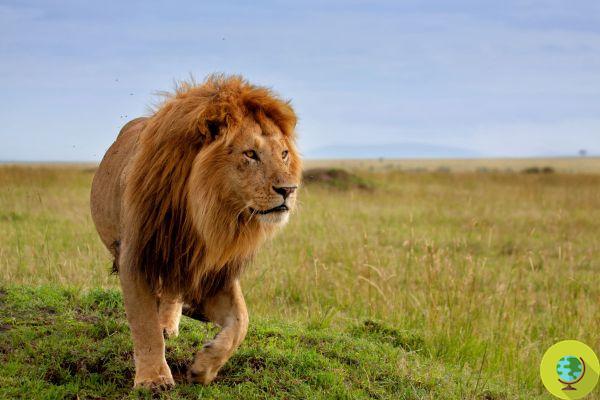
In about 100 years, the lion population in Africa has plummeted by 90% due to habitat loss, illegal trade and conflicts with humans.
He is about to end up run over, his mother saves himThe king of the savannah, an icon of pride and courage, is increasingly in danger. In about 100 years, the population of this majestic species has collapsed by 90% in Africa, from 200.000 specimens less than 20.000. And, as often happens, behind the decline of these big cats, there is the hand of man. Lions, in fact, have to deal with various threats, including habitat loss and illegal trade. And in recent years the situation has only worsened: according to the IUCN (International Union for Conservation of Nature), between 1994 and 2014 there was a decline of 43% in the lion population on the African continent. In the absence of effective measures and conservation projects for this species, experts predict a further decline of 50% over the next 20 years.
The conservation status of the lions
African lions have long been classified as a single subspecies (Panthera leo leo), according to more recent studies the lions living in Asia, West Africa, central and northern Africa belong to the subspecies Panthera leo leo, while those of southern and eastern Africa are classified like Panthera leo melanochaita.
Pending the adoption of a new definitive classification, the lion is still considered a single species and included in the Red List of endangered species in the "Vulnerable" category.
As highlighted by the WWF, "this generalization, however, masks local conservation successes and failures: for example, the population of West Africa is considered Critically Endangered (with a decline between 1993 and 2014 equal to 66%), while the Eastern population it is considered in Danger (decline in the same period of time equal to 57%); Southern Africa is the one that has experienced the most significant decline in the past, but recently some populations have remained stable while others have shown signs of recovery. "
Lions have already become extinct in 26 African countries and today they are present in only 27 states of the continent. With the expansion of the human population and related activities including the raising of livestock, the habitats of lions fragment at very fast rates, eventually disappearing. This leads to a lower availability of wild prey for these big cats and to greater occasions of man-nature conflict.
Habitat loss, illegal trade and man-nature conflicts: the main threats to lions
Lions face multiple threats, often aggravated by the absence of coherent and integrated conservation actions and adequate land management policies. First, the habitats of these felines are degrading and fragmenting at unprecedented rates as the population on African territory is growing and is set to double by 2050. Thus the areas that originally housed lions and other species are now being converted into agricultural land or used for mining. As if that weren't enough, habitat fragmentation exacerbates the loss of genetic diversity, making lions more vulnerable to disease and decreasing the species' reproductive success. Disappearing habitats also decreases the prey available for lions, although the main cause of the disappearance of prey is the trade in bushmeat.
"Subsistence hunting has caused widespread decline in wildlife and is the main threat to lions within protected areas," WWF explains. - “In addition to reducing the prey, the use of traps, snares, poisons creates infinite dangers for the species, which hunts over vast territories. In fact, many lions are injured or killed by traps intended for other animals. "
Another huge threat to the king of the savannah is the illegal trade of these huge felines and their parts, such as skin, teeth and claws, in great demand by collectors and used by traditional Chinese medicine. There are still many illegal concentration camps in which lions are held captive and subjected to torture waiting to become "trophies" for the so-called "canned hunting", or the hunting of wild animals kept in captivity.
Also conflicts between humans and lions are a major cause of the decline of these mammals. In several parts of Africa, lions frequently come into conflict with humans when livestock are raised in their habitat. Very often, lions are seen as enemies of communities and killed without mercy.
"These conflicts occur both inside and outside the protected areas" - clarifies the WWF - "Outside, where wildlife and man share the same space, in the absence of effective measures and conservation projects dedicated, conflict can lead to local extinctions and the loss of individuals or groups of lions. Within the protected areas, conflicts are concentrated above all, towards the borders where both the lions can occasionally leave the protected area and the breeders can invade the protected area. "
This phenomenon has a very heavy impact on the lion population and on the hierarchy of these cats, for example due to the increase in adult mortality. Finally, climate change also leads to an increase in conflicts between men and lions because protected areas, thanks to the integrity of ecosystems, have a greater availability of water and farmers, in periods of drought (increasingly frequent), enter in protected reserves to water their herds.
Source: WWF
Read also:
- World Lion Day: in 25 years African lions have decreased by 43%, let's save them from extinction
- South Africa bans the breeding of lions for hunting (but that's not enough)
- 10 lions raised to be killed by trophy hunters are rescued from a lager farm
- Tiger farms: the cruel business that makes these felines worth so much more dead than alive


























